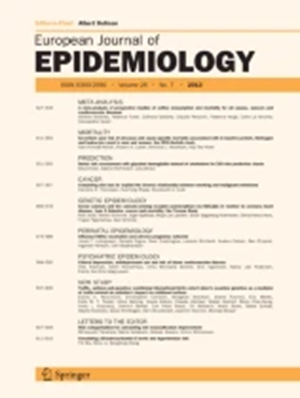Use of systemic hormonal contraception and risk of depression: a registry-based study from Finland.
IF 5.9
1区 医学
Q1 PUBLIC, ENVIRONMENTAL & OCCUPATIONAL HEALTH
引用次数: 0
Abstract
Earlier findings on the relationship between use of hormonal contraception (HC) and depressive symptoms and disorders are contradictory. Thus, we assessed the associations of use of different types of systemic hormonal contraceptives in the six preceding months with the risk of depression in women aged 15-49 years. Data were obtained from national registers in Finland. All cases of depression in the years 2018-2019 were identified in a population-based cohort of women. We used a nested case-control design with 1:4 ratio (n = 117,360 cases) and applied multivariable conditional logistic regression models. During the follow-up a total of 23,480 new cases with the diagnosis of depression were observed (incidence rate: 21.7, 95% confidence interval = 21.5-22.0 per 1000 person-years). Use of HC in the six preceding months, specifically that of combined hormonal contraceptives (containing gestodene and ethinylestradiol, drospirenone and ethinylestradiol, and nomegestrol and estradiol), was significantly associated with a lower risk of depression compared to non-use when controlling for marital status, socioeconomic status, education, recent delivery, recent psychiatric hospitalization, chronic diseases, use of psychiatric medications (excluding antidepressants) and former use of HC (odds ratio: 0.90, 95% confidence interval = 0.85-0.95; 0.86, 95% confidence interval = 0.81-0.91, respectively). Current use of progestogen-only preparations (norethisterone, levonorgestrel, desogestrel) was not associated with depression. This pattern was evident in all age groups, including adolescent girls. HC use appeared not associated with an increased risk of depression in fertile-aged women and across all age groups, including adolescent girls.使用系统性激素避孕与抑郁症风险:芬兰的一项基于登记的研究。
早期关于使用激素避孕(HC)与抑郁症状和障碍之间关系的发现是矛盾的。因此,我们评估了15-49岁女性在前6个月内使用不同类型的全身激素避孕药与抑郁风险的关系。数据来自芬兰的国家登记册。2018-2019年的所有抑郁症病例都是在以人群为基础的女性队列中发现的。我们采用1:4比例的嵌套病例对照设计(n = 117,360例),并应用多变量条件逻辑回归模型。在随访期间,共观察到23,480例诊断为抑郁症的新病例(发病率:21.7,95%置信区间= 21.5-22.0 / 1000人年)。在前6个月内使用HC,特别是使用联合激素避孕药(含孕酮和炔雌醇、屈螺酮和炔雌醇、异孕酮和雌二醇),在控制婚姻状况、社会经济状况、教育程度、最近分娩、最近精神病住院、慢性病的情况下,与不使用相比,患抑郁症的风险较低。使用精神药物(不包括抗抑郁药)和曾经使用过HC(优势比:0.90,95%可信区间= 0.85-0.95;0.86, 95%可信区间分别为0.81-0.91)。目前仅使用孕激素制剂(去甲睾酮、左炔诺孕酮、去吉奥孕酮)与抑郁症无关。这种模式在所有年龄组都很明显,包括青春期女孩。在育龄妇女和所有年龄组(包括青春期女孩)中,HC的使用似乎与抑郁症风险增加无关。
本文章由计算机程序翻译,如有差异,请以英文原文为准。
求助全文
约1分钟内获得全文
求助全文
来源期刊

European Journal of Epidemiology
医学-公共卫生、环境卫生与职业卫生
CiteScore
21.40
自引率
1.50%
发文量
109
审稿时长
6-12 weeks
期刊介绍:
The European Journal of Epidemiology, established in 1985, is a peer-reviewed publication that provides a platform for discussions on epidemiology in its broadest sense. It covers various aspects of epidemiologic research and statistical methods. The journal facilitates communication between researchers, educators, and practitioners in epidemiology, including those in clinical and community medicine. Contributions from diverse fields such as public health, preventive medicine, clinical medicine, health economics, and computational biology and data science, in relation to health and disease, are encouraged. While accepting submissions from all over the world, the journal particularly emphasizes European topics relevant to epidemiology. The published articles consist of empirical research findings, developments in methodology, and opinion pieces.
 求助内容:
求助内容: 应助结果提醒方式:
应助结果提醒方式:


